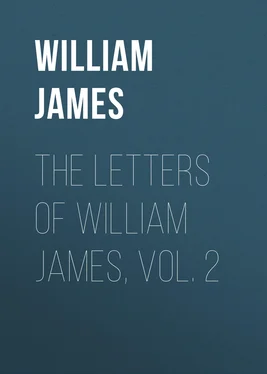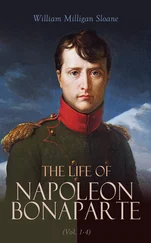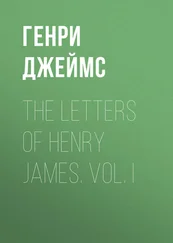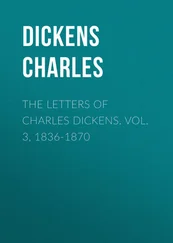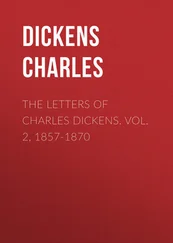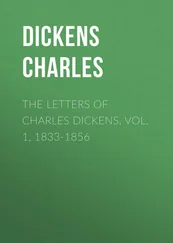William James - The Letters of William James, Vol. 2
Здесь есть возможность читать онлайн «William James - The Letters of William James, Vol. 2» — ознакомительный отрывок электронной книги совершенно бесплатно, а после прочтения отрывка купить полную версию. В некоторых случаях можно слушать аудио, скачать через торрент в формате fb2 и присутствует краткое содержание. Жанр: Биографии и Мемуары, Философия, foreign_edu, foreign_antique, на английском языке. Описание произведения, (предисловие) а так же отзывы посетителей доступны на портале библиотеки ЛибКат.
- Название:The Letters of William James, Vol. 2
- Автор:
- Жанр:
- Год:неизвестен
- ISBN:нет данных
- Рейтинг книги:3 / 5. Голосов: 1
-
Избранное:Добавить в избранное
- Отзывы:
-
Ваша оценка:
- 60
- 1
- 2
- 3
- 4
- 5
The Letters of William James, Vol. 2: краткое содержание, описание и аннотация
Предлагаем к чтению аннотацию, описание, краткое содержание или предисловие (зависит от того, что написал сам автор книги «The Letters of William James, Vol. 2»). Если вы не нашли необходимую информацию о книге — напишите в комментариях, мы постараемся отыскать её.
The Letters of William James, Vol. 2 — читать онлайн ознакомительный отрывок
Ниже представлен текст книги, разбитый по страницам. Система сохранения места последней прочитанной страницы, позволяет с удобством читать онлайн бесплатно книгу «The Letters of William James, Vol. 2», без необходимости каждый раз заново искать на чём Вы остановились. Поставьте закладку, и сможете в любой момент перейти на страницу, на которой закончили чтение.
Интервал:
Закладка:
I, you see, am farther away from home than I have ever been before on this side of the Atlantic, namely, in the state of Colorado, and just now in the heart of the Rocky Mountains. I have been giving a course of six lectures on psychology "for teachers" at a so-called "summer-school" in Colorado Springs. I had to remain for three nights and three days in the train to get there, and it has made me understand the vastness of my dear native land better than I ever did before.... The trouble with all this new civilization is that it is based, not on saving, but on borrowing; and when hard times come, as they did come three years ago, everyone goes bankrupt. But the vision of the future, the dreams of the possible, keep everyone enthusiastic, and so the work goes on. Such conditions have never existed before on so enormous a scale. But I must not write you a treatise on national economy!—I got through the year very well in regard to health, and gave in the course of it, what I had never done before, a number of lectures to teachers in Boston and New York. I also repeated my course in Cosmology in the new woman's College which has lately been established in connection with our University. The consequence is that I laid by more than a thousand dollars, an absolutely new and proportionately pleasant experience for me. To make up for it, I haven't had an idea or written anything to speak of except the "presidential address" which I sent you, and which really contained nothing new....
And now is not that enough gossip about ourselves? I wish I could, by telephone, at this moment, hear just where and how you all are, and what you are all doing. In the mountains somewhere, of course, and I trust all well; but it is perhaps fifteen or twenty years too soon for transatlantic telephone. My surroundings here, so much like those of Switzerland, bring you before me in a lively manner. I enclose a picture of one of the streets at Colorado Springs for Madame Flournoy, and another one of a "cowboy" for that one of the demoiselles who is most romanesque . Alice, Blanche—but I have actually gone and been and forgotten the name of the magnificent third one, whose resplendent face I so well remember notwithstanding. Dulcissima mundi nomina , all of them; and I do hope that they are being educated in a thoroughly emancipated way, just like true American girls, with no laws except those imposed by their own sense of fitness. I am sure it produces the best results! How did the teaching go last year? I mean your own teaching. Have you started any new lines? And how is Chantre? and how Ritter? And how Monsieur Gowd? Please give my best regards to all round, especially to Ritter. Have you a copy left of your "Métaphysique et Psychologie"? In some inscrutable way my copy has disappeared, and the book is reported épuisé .
With warmest possible regards to both of you, and to all five of the descendants, believe me ever faithfully yours,
W. James.To his Daughter
Sweetest of Living Pegs,—Your letter made glad my heart the day before yesterday, and I marveled to see what an improvement had come over your handwriting in the short space of six weeks. "Orphly" and "ofly" are good ways to spell "awfully," too. I went up a high mountain yesterday and saw all the kingdoms of the world spread out before me, on the illimitable prairie which looked like a map. The sky glowed and made the earth look like a stained-glass window. The mountains are bright red. All the flowers and plants are different from those at home. There is an immense mastiff in my house here. I think that even you would like him, he is so tender and gentle and mild, although fully as big as a calf. His ears and face are black, his eyes are yellow, his paws are magnificent, his tail keeps wagging all the time, and he makes on me the impression of an angel hid in a cloud. He longs to do good.
I must now go and hear two other men lecture. Many kisses, also to Tweedy, from your ever loving,
Dad.On December 17, 1895, President Cleveland's Venezuela message startled the world and created a situation with which the next three letters are concerned. The boundary dispute between Venezuela and British Guiana had been dragging along for years. The public had no reason to suppose that it was becoming acute, or that the United States was particularly interested in it, and had, in fact, not been giving the matter so much as a thought. All at once the President sent a message to Congress in which he announced that it was incumbent upon the United States to "take measures to determine … the true" boundary line, and then to "resist by every means in its power as a willful aggression upon its rights and interests" any appropriation by Great Britain of territory not thus determined to be hers. In addition he sent to Congress, and thus published, the diplomatic despatches which had already passed between Mr. Olney and Lord Salisbury. In these Mr. Olney had informed the representative of the Empire which was sovereign in British Guiana "that distance and three thousand miles of intervening ocean make any permanent political union between a European and an American state unnatural and inexpedient," and that "today the United States is practically sovereign on this continent, and its fiat is law upon the subjects to which it confines its interposition." Lord Salisbury had squarely declined to concede that the United States could, of its own initiative, assume to settle the boundary dispute. It was difficult to see how either Great Britain or the United States could with dignity alter the position which its minister had assumed.
James was a warm admirer of the President, but this seemingly wanton provocation of a friendly nation horrified him. He considered that no blunder in statesmanship could be more dangerous than a premature appeal to a people's fighting pride, and that no perils inherent in the Venezuela boundary dispute were as grave as was the danger that popular explosions on one or both sides of the Atlantic would make it impossible for the two governments to proceed moderately. He was appalled at the outburst of Anglophobia and war-talk which followed the message. The war-cloud hung in the heavens for several weeks. Then, suddenly, a breeze from a strange quarter relieved the atmosphere. The Jameson raid occurred in Africa, and the Kaiser sent his famous message to President Kruger. 4 4 In a brief letter to the Harvard Crimson (Jan. 9, 1896), James urged the right and duty of individuals to stand up for their opinions publicly during such crises, even though in opposition to the administration. Mr. Rhodes, in his History of the United States, 1877-1896 , makes the following observation: "Cleveland, in his chapter on the 'Venezuelan Boundary Controversy,' rates the un-Americans who lauded 'the extreme forbearance and kindness of England.' … The reference … need trouble no one who allows himself to be guided by two of Cleveland's trusted servants and friends. Thomas F. Bayard, Secretary of State during the first administration, and actual ambassador to Great Britain, wrote in a private letter on May 25, 1895, 'There is no question now open between the United States and Great Britain that needs any but frank, amicable and just treatment.' Edward J. Phelps, his first minister to England, in a public address on March 30, 1896, condemned emphatically the President's Venezuela policy." See Rhodes, History , vol. VIII, p. 454; also p. 443 et seq.
The English press turned its fire upon the Kaiser. The world's attention was diverted from Venezuela, and the boundary dispute was quietly and amicably disposed of.
To E. L. Godkin
Darling old Godkin,—The only Christmas present I can send you is a word of thanks and a bravo bravissimo for your glorious fight against the powers of darkness. I swear it brings back the days of '61 again, when the worst enemies of our country were in our own borders. But now that defervescence has set in, and the long, long campaign of discussion and education is about to begin, you will have to bear the leading part in it, and I beseech you to be as non-expletive and patiently explanatory as you can, for thus will you be the more effective. Father, forgive them for they know not what they do! The insincere propaganda of jingoism as a mere weapon of attack on the President was diabolic. But in the rally of the country to the President's message lay that instinct of obedience to leaders which is the prime condition of all effective greatness in a nation. And after all, when one thinks that the only England most Americans are taught to conceive of is the bugaboo coward-England, ready to invade the Globe wherever there is no danger, the rally does not necessarily show savagery, but only ignorance. We are all ready to be savage in some cause. The difference between a good man and a bad one is the choice of the cause.
Читать дальшеИнтервал:
Закладка:
Похожие книги на «The Letters of William James, Vol. 2»
Представляем Вашему вниманию похожие книги на «The Letters of William James, Vol. 2» списком для выбора. Мы отобрали схожую по названию и смыслу литературу в надежде предоставить читателям больше вариантов отыскать новые, интересные, ещё непрочитанные произведения.
Обсуждение, отзывы о книге «The Letters of William James, Vol. 2» и просто собственные мнения читателей. Оставьте ваши комментарии, напишите, что Вы думаете о произведении, его смысле или главных героях. Укажите что конкретно понравилось, а что нет, и почему Вы так считаете.
